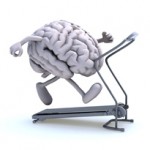 Brain training vs. mental stimulation?
Brain training vs. mental stimulation?
Anything you do involving novelty, variety, and challenge stimulates the brain and is a pleasurable way to pass time. Lifelong brain fitness, though, involves more. Crosswords or playing chess stimulate your brain and that’s good. But it isn’t brain training.
For noticeable brain improvement you need activities that target your own areas of weak performance. The difference is similar to physical fitness – walking or playing tennis are good for you but for real improvements you need specific training e.g. cardio endurance, core strength and flexibility.
It is not one or the other.
How will brain training work best?
The way to measure success is through the transfer of skills to improvement in daily life.
Here are the five key conditions needed:
- The task must exercise a core brain-based capacity that is relevant to real-life outcomes, such as paying close attention, using working memory or Dr. Lamont’s six key memory skills. General practice isn’t enough.
- The task must target the part of your own memory performance that needs help – Training your brain for skills you don’t need won’t bring improvement. Identify the skills YOU need e.g. Do I need to improve driving-related cognitive skills? Concentration? Memory? Regulating stress and emotions? Remembering names and facts? The choice of a technique or technology should be driven by your goal. Otherwise you’ll wonder why this doesn’t “work” for you (even though the tasks may have been brilliant for someone else).
- For real improvement, you need to practise for a minimum of 15 hours total per targeted brain function, performed over 8 weeks or less. Training only a few hours across a wide variety of
 brain functions won’t trigger real-world benefits, in the same way that going to the gym a couple times per month and doing an assortment of undirected exercises won’t result in increased muscle strength and physical fitness.
brain functions won’t trigger real-world benefits, in the same way that going to the gym a couple times per month and doing an assortment of undirected exercises won’t result in increased muscle strength and physical fitness. - Training must require focused effort, attention and increase in difficulty. This is a key advantage of computerized “brain training” over pen-and-paper-based activities. Interactive training can constantly monitor your level of performance and adapt accordingly.
- Continued practice is required for continued benefits. A one-time brain training activity will be enjoyable but won’t bring life-long benefits.
15 hours over 8 weeks will bring about brain improvement in the target area; but continued practice as a periodic “booster” is needed for transfer to real-world benefits.
Memory Foundation has a range of brain tools to help you identify your weaker areas and address those with specific training.
Why not start with our free Brain Tune™
For more reading: Amazing Memory Tune trial results, Boost Your Brain Power. Try a 2-minute short-term memory exercise now. For a reader assessment of our free brain training course, Does Brain Tune™ work?.
(Research cited by Alvaro Fernandez, Sharp Brains.)




